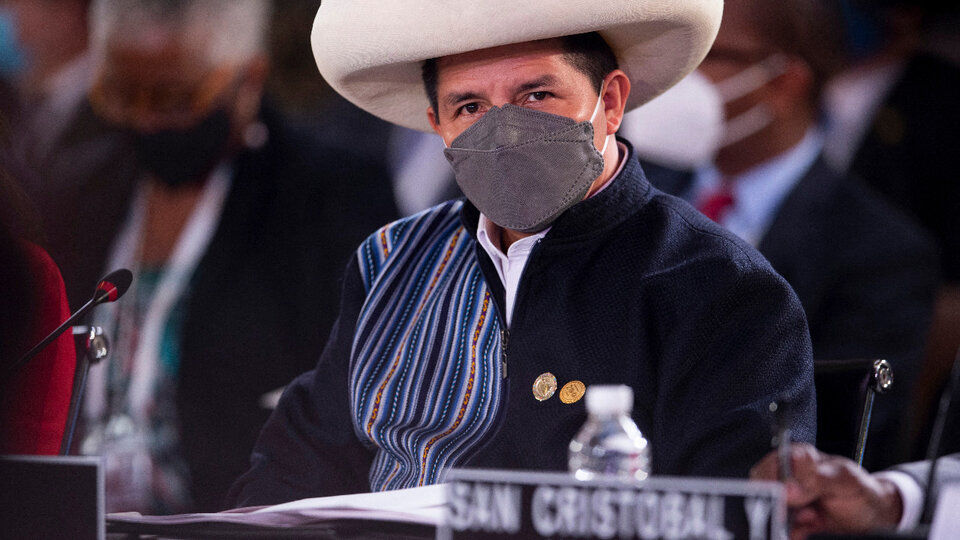From Lima
President Pedro Castillo left without a floor the announcement of his prime minister of a possible expropriation of the gas fields, in the hands of a transnational consortium in which two Argentine companies. Castillo was quick to try to tone down the commotion caused by the statements of the ministerial cabinet chief, Guido Bellido, who announced that if the Camisea Consortium, which exploits and distributes 92 percent of the gas produced in the country, would not agree to renegotiate the terms of the contract with the State, denounced from various sectors for favoring the private consortium to the detriment of the country, the gas fields would be nationalized. The president ratified the government’s willingness to renegotiate gas contracts to improve state participation and lower its price for consumers, but denied a possible nationalization. Castillo assured that this renegotiation would be done “with unrestricted respect for the rule of law.”
Bellido unleashed the storm with his surprise announcement. “We summoned the Camisea gas operator and marketer to renegotiate the distribution of profits in favor of the State. Otherwise, we will opt for the recovery or nationalization of our deposit, “said the head of the ministerial cabinet. The surprise was not in the call for a renegotiation, an intention that the government has made clear from the beginning and that it is a campaign offer, but in the announcement of a possible expropriation.
“Communist threat”
Bellido’s message that opens the door to nationalization – which Castillo later closed – was used by the right-wing political and media opposition to reinforce their attacks against the left-wing government, seeking to create a scenario of uncertainty and fear, speaking of “communist threat ”and“ nationalization of the economy ”. Attacks that take place in a context in which a sector of the opposition, with a significant presence in Congress, and a large part of the media, are maneuvering to destabilize the Castillo regime. Entrepreneurs threatened a retraction of investments.
Seeking to calm things down, Castillo wrote on Twitter: “In this people’s government we are committed to bringing cheap gas to all Peruvians. Any renegotiation will be done with unrestricted respect for the rule of law and ensuring national interests. The State and the private sector working together for a better Peru ”. Your message has been a disavowal of your chief of staff. But the attacks from the right did not lower the tone. In Congress, the opposition announced that it will call the chief of the cabinet for his statements and threatened to dismiss him -the Congress has the power to censor ministers- if the president did not change it.
On a recent trip to the United States, Castillo met with financial organizations and businessmen, to whom he assured that the possibility of any nationalization is ruled out. Along these lines, the Minister of Economy, Pedro Francke, has assured on several occasions, in the media and in meetings with businessmen, that there will be no nationalizations. What Bellido said about the Camisea gas goes in the opposite direction.
Internal differences
In the government, everyone agrees on the need to renegotiate contracts of Camisea, but there are disagreements on whether expropriation should be an alternative. Differences that have been made public amid tensions within the government due to discrepancies among its members. There is talk of a radical sector and a moderate sector. Bellido, a congressman and leader of the ruling Peru Libre (PL) party, is identified with the so-called radical sector, which heads the PL leadership. PL Secretary General Vladimir Cerrón came out to enthusiastically support the nationalization of gas. The ruling party parliamentary bench, with 37 members out of a total of 130, whose spokesperson is Vladimir Cerrón’s brother, supported Bellido, but a group of government legislators clarified that this pronouncement was not supported by the entire bench. Several ministers, including those of Energy and Mines and Economy, spoke out against a possible nationalization of gas. The right wing encourages and exploits the differences in the internal government to hit the Castillo regime, which they seek to overthrow.
Consortium with Argentine capital
The Camisea Consortium is made up of five companies, between them Argentina’s Pluspetrol, with 27.2 percent, and Tecpetrol, which has 10 percent. The other companies are the American Hunt Oil (25.1 percent), the Korean SK (17.6 percent), the Spanish Repsol (10 percent) and the Algerian Sonatrach (10 percent). The gas exploitation and commercialization contracts, which came into effect in 2004, are questioned because they allow its export with a low payment of royalties. Export has been prioritized and there has not been a policy to massify domestic consumption of natural gas, cheaper and less polluting than liquefied petroleum gas. Consumption of natural gas is low and is mainly concentrated in Lima. The Camisea gas fields are in the south of the country, but these populations do not have access to this gas.
Prioritize the internal consumption of gas produced in the country and improve the participation of the State in export earnings, they are central points of the renegotiation promoted by the government. This Monday, Bellido personally delivered a letter to Pluspetrol’s offices calling them for a first meeting this Wednesday to start this renegotiation. The right wing, which has shouted to heaven for Bellido’s statements, has endorsed these contracts that are harmful to the interests of the country for years.
.
